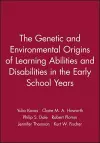
The Genetic and Environmental Origins of Learning Abilities and Disabilities in the Early School Years
6 authors - Paperback
£36.86 was £40.95
Yulia Kovas received her Ph.D. in 2007 from the SGDP Centre, Institute of Psychiatry. She obtained teaching qualifications from the University of St. Petersburg, Russia in 1996 and taught children of all ages for 6 years. She received a B.Sc. in Psychology from Birkbeck College, University of London in 2003 and an M.Sc. in Social, Genetic, and Developmental Psychiatry from the Institute of Psychiatry, London in 2004. Her current interests include genetic and environmental etiology of individual differences in mathematical ability and disability and the etiology of covariation and comorbidity between different learning abilities and disabilities.
Claire M. A. Haworth is a Ph.D. Student at the Social, Genetic and Developmental Psychiatry Centre at the Institute of Psychiatry. In 2004 she graduated from Oxford University with a B.A. in Experimental Psychology, and in 2006 was awarded an M.Sc. in Social, Genetic and Developmental Psychiatry. Her research interests include the use of quantitative and molecular genetic techniques to unravel the genetic and environmental influences on quantitative traits. Her traits of interest include academic and cognitive abilities and disabilities. Claire is particularly interested in science performance in schools, and how science is related to other cognitive and academic abilities.
Philip S. Dale is Professor and Chair of Speech and Hearing Sciences at the University of New Mexico. He received his Ph.D. in communication sciences from the University of Michigan in 1968. His current research interests center on issues of assessment, sources, and consequences of individual differences in early language development and the emergence of literacy, cross-linguistic and cross-cultural comparisons, and outcomes of parent- and classroom-based intervention for developmental disabilities.
Robert Plomin is MRC Research Professor and Deputy Director of the SGDP Centre at the Institute of Psychiatry in London. He received his Ph.D. in psychology from the University of Texas at Austin in 1974. He was then at the Institute for Behavioral Genetics in Boulder, Colorado (1974–1986) and at Pennsylvania State University (1986–1994) until he moved to London and launched the Twins Early Development Study (TEDS). His current research combines quantitative genetic and molecular genetic analyses of learning abilities and disabilities in childhood. Richard A. Weinberg (Ph.D., 1968, University of Minnesota) is Distinguished University Teaching Professor of Child Psychology at the Institute of Child Development, University of Minnesota, where he is also Director of the Center for Early Education and Development and Adjunct Professor of Psychology and Educational Psychology. He has collaborated with Sandra W. Scarr for over 35 years pursuing research in developmental behavior genetics.
Jennifer Thomson is an Assistant Professor at the Harvard Graduate School of Education, having moved from the Centre for Neuroscience in Education, University of Cambridge, U.K. Her current research focuses upon the links between language and literacy development, specifically, the role of linguistic rhythm sensitivity in dyslexia. She is also particularly interested in how neuroscience can be usefully applied to the fields of learning and remediation.
Kurt Fischer analyzes cognition, emotion, and learning and their relation to biological development and educational assessment. In his research, he has discovered a scale that seems to assess learning and development in all domains, even when the skills created in each domain are independent. As head of the Mind, Brain, and Education program and Charles Bigelow Professor of Education and Human Development at the Harvard Graduate School of Education, he leads an international movement to connect biology and cognitive science to education. His most recent book is Mind, Brain, and Education in Reading Disorders (Cambridge University Press, 2006). He is founding president of the International Mind, Brain, and Education Society and founding editor of the journal Mind, Brain, and Education (Blackwell).